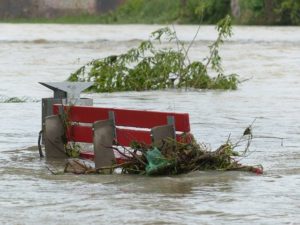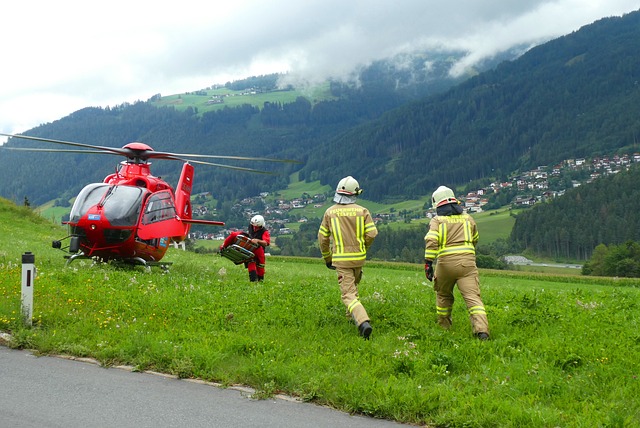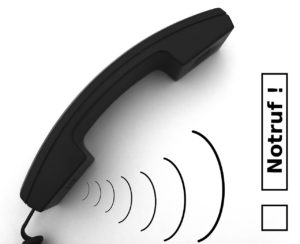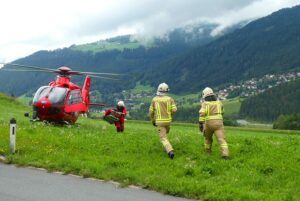Menu Item

Disaster preparedness
The Federal office of Civil protection suggests that you keep certain items in your house so that you can be prepared in a disaster situation.Such
Menu Item

It is very important that you are aware that according to Section § 323c of the Criminal Code (Strafgesetzbuch) your are obliged to help a person in need. You can either call 112 (national emergency number) and 110 (The police) to get assistance.
Section 323c
1. Failure to render assistance; obstruction of persons rendering assistance1) Whoever does not render assistance in the case of an accident or a common danger or emergency although it is necessary and can reasonably be expected under the circumstances, in particular if it is possible without substantial danger to that person and without breaching other important duties, incurs a penalty of imprisonment for a term not exceeding one year or a fine.
2. Whoever obstructs a person who is rendering or wishes to render assistance to another person in such a situation incurs the same penalty.
German
(1) Wer bei Unglücksfällen oder gemeiner Gefahr oder Not nicht Hilfe leistet, obwohl dies erforderlich und ihm den Umständen nach zuzumuten, insbesondere ohne erhebliche eigene Gefahr und ohne Verletzung anderer wichtiger Pflichten möglich ist, wird mit Freiheitsstrafe bis zu einem Jahr oder mit Geldstrafe bestraft.
According to bussgeldkatalog.org
“StGB: Section 323c regulates failure to provide assistance.
Failure to provide assistance, legally standardized in § 323c StGB, is a so-called genuine omission offense. In contrast to the bogus omission offenses, this is expressly regulated as an act of omission.
The purpose of the standard is to ensure a general duty of solidarity. Anyone who is able to provide help should do so if an accident occurs.
The penalty for failure to provide assistance is imprisonment of up to one year or a fine. It is therefore a misdemeanor and not a crime. The latter is a criminal offense, the minimum of which is punishable by imprisonment of one year or more. If the range of punishment is below this, there is talk of an offense. Paragraph 1 of Section 323c of the Criminal Code states:
Anyone who does not provide help in the event of an accident or common danger or need, although this is necessary and can be expected from the circumstances, in particular without significant personal risk and without violating other important obligations, will be punished with imprisonment for up to one year or with a fine.
There are numerous examples of failure to provide assistance. Classic situations are those in which a person has been injured as a result of an accident and a passer-by remains inactive without providing first aid or alerting rescue workers.
Failure to provide assistance can also be considered if witnesses of bodily harm fail to take the measures outlined above, although they would have been able to do so without further ado.”

The Federal office of Civil protection suggests that you keep certain items in your house so that you can be prepared in a disaster situation.Such

The following numbers can be dialled in an emergency, either from a landline or mobile phone. 112The national emergency number. This can be used for

Where to find information The Bundesamt für Justiz publishes the laws and regulations to a the Gesetze im internet website. The main site is in

The Federal office of Civil protection suggests that you keep certain items in your house so that you can be prepared in a disaster situation.
Such a situation can easily occur during extreme weather conditions like snow or flooding.
The national emergency number is 112
It is a good idea to install the Nina app (Notfall-Informations- und Nachrichten) from the BKK (Bundesamt für Bevölkerungsschutz und Katastrophenhilfe)
A manual on how to prepare and what to do during a disaster situation can be downloaded in German here, and also in English
A person can manage for three weeks without food but only four days without water or liquids, but what else do you need?
You can download the complete list of suggestions here
Here are some items on the list that they suggest you have in your house
There are more items on their list like documents and an emergency bag with clothes, blankets etc.
Also, take note that according to Section § 323c of the Criminal Code (Strafgesetzbuch) you are obliged to help a person in need:
Section 323c
Failure to render assistance; obstruction of persons rendering assistance
1. Whoever does not render assistance in the case of an accident or a common danger or emergency although it is necessary and can reasonably be expected under the circumstances, in particular, if it is possible without substantial danger to that person and without breaching other important duties, incurs a penalty of imprisonment for a term not exceeding one year or a fine.
2. Whoever obstructs a person who is rendering or wishes to render assistance to another person in such a situation incurs the same penalty.
You can read more about it here

It is very important that you are aware that according to Section § 323c of the Criminal Code (Strafgesetzbuch) your are obliged to help a

German Climate Germany’s climate is temperate and marine, with cold, cloudy winters and warm summers and in the south occasional warm föhn wind. The greater

The following numbers can be dialled in an emergency, either from a landline or mobile phone. 112The national emergency number. This can be used for
You must be logged in to post a comment.